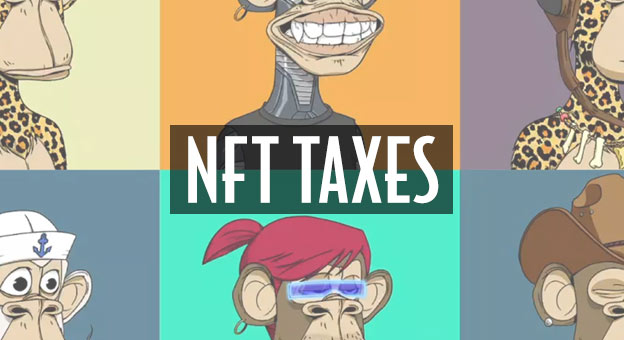The non-fungible token, or NFT, is the newest and most popular trend in digital finance. Numerous individuals are buying their way into it, earning substantial profits in some cases!
While the NFT concept itself is not entirely novel, the market that is developing around it is. The NFT market is based on a system built around cryptocurrencies, and cryptocurrencies are frequently used to buy and sell NFTs directly. However, these similarities end there.
Anyone with money can take advantage of the numerous investment opportunities in the NFT market. However, you should ensure that you are aware of what you are getting into before making the leap and exploring the new digital economy and NFT marketplaces like OpenSea and Coinbase NFT.
Additionally, you must be aware of your financial obligations. There are many different ways that NFTs are taxed, and if you don’t know about them before you start investing, you might end up paying too much in taxes.
First, What Is an NFT?

An NFT is a blockchain-based digital asset or “non-fungible token” that can be traded online. The same system that is used to keep track of cryptocurrency transactions also keeps track of NFT trading.
This indicates that the blockchain essentially verifies your ownership of an NFT on your behalf and ensures that it cannot be stolen or forged. Your NFT serves as an ownership certificate.
The term “non-fungible token” refers to the fact that (in contrast to fungible cryptocurrencies) each NFT is unique. Every NFT is a distinct asset with its own value, despite the fact that two bitcoins are identical and can be used interchangeably.
The buying and selling of digital art images that do not exist outside of digital space have been the primary focus of recent NFT trading. However, a wide variety of assets can be NFTs including:
- Digital or even physical artwork
- Music NFTs
- Sports highlights and other videos
- Collectible sneakers or other fashion items
- Video game NFT items or rewards
- Other tangible collectibles
5 NFT Tax Tips
If you’re going to sell, buy, or invest in NFTs then you need to be aware of how they are taxed. Here are five important NFT tax tips:
1. NFTs: Short-Term vs. Long-Term Capital Gains
The IRS’s capital gains tax regulations must be adhered to by anyone investing in or trading NFTs. Like any other stock investment, your NFT is capital that you own, and you will pay taxes whenever that capital increases in value.
Because the capital gains tax rate varies significantly from one time period to the next, this will necessitate paying close attention to the distinction between short-term and long-term capital gains.
- Short-term capital gains: NFT ownership of one year or less before the sale is considered short-term capital gains
- Long-term capital gains: If you own an NFT for even one day longer than one year the IRS considers your profit to be long-term capital gains
2. NFTs Must Be Reported on Your Taxes (Even If You Don’t Sell Them)
Your NFTs must be reported on your taxes because an NFT is considered to be property. Even though you won’t pay capital gains on the NFT itself until it is sold, you should keep track of its appreciation or depreciation.
However, the majority of NFTs are purchased using cryptocurrency, making the purchase itself a taxable event. Depending on how the value of the cryptocurrency has changed since you bought it, spending your cryptocurrency at any point results in either a capital gain or a capital loss.
Let’s say you buy a cryptocurrency like Bitcoin and use it to buy an NFT a few weeks later. You just made a trade based on an initial investment in cryptocurrency, even if you never sell or trade that NFT.
You will be responsible for paying taxes on short-term capital gains if the cryptocurrency in question increased in value during those weeks. If there was a decline in value, that will be counted in your favor when determining your tax liability on your personal return as a capital loss.
3. OpenSea, NFT Transactions Are Taxable
Every time you trade or sell an NFT on sites like OpenSea, you may also be liable for tax. You will be required to pay regular income taxes on any money you earn based on your personal income tax bracket if you are an artist who creates and sells NFTs.
Capital gains taxes will apply to any trades or investments made in NFTs that you did not create yourself. You will be required to pay taxes based on the asset’s change in value since you purchased it whenever you sell or trade it away.
The profit you’ve made from the OpenSea exchange is subject to this tax. If you bought it more than a year ago, the tax rate for that profit will be either the short-term capital gains rate or the long-term capital gains rate.
The tax on short-term capital gains is the same for all income. The individual’s income tax bracket will determine which long-term capital gains are taxed at a lower rate.
The IRS’s classification of these purchases will also influence the precise tax rates applicable to these transactions. The IRS may have rules about “collectibles” that apply to some NFTs, which may result in a higher capital gains rate.
*Is selling NFTs part of your business? We have a coupon for QuickBooks here
4. NFT Tax Regulations Will Continue to Evolve
I didn’t even know what an NFT was a year ago, so who knows how it will change in the future. Because the digital economy centered on NFTs is still in its infancy and expanding at a rapid rate, tax regulations and laws pertaining to them are still catching up. The IRS and the United States government as a whole have yet to decide how they will tax or otherwise regulate these online transactions.
5. Use the Best Tax Software to Report NFT Sales & Purchases
Unless you employ a very sharp (and probably expensive!) accountant you’ll need tax software that keeps up with the ever-changing digital landscape that includes NFTs.
For this reason, I don’t recommend using any second-rate or “free” tax software. In fact, we’re happy to recommend TurboTax (coupon here!), which follows up to the minute changes in crypto and NFT tax regulation. If are thinking about using TurboTax, their Free Edition won’t work if you have investments like NFT purchases or sales.
Instead, consider their Premier Edition, or possibly the Self-Employed Edition if you earn income from NFT sales.
I hope you profit from your NFT sales or investments, and now have a better understanding of how NFTs are taxed. Thanks for stopping by Might Taxes!


